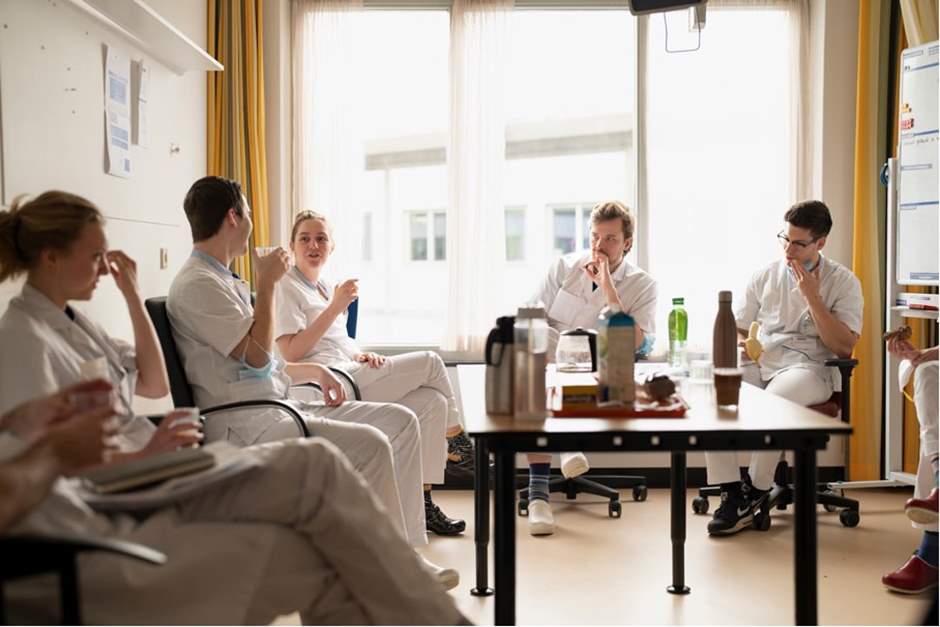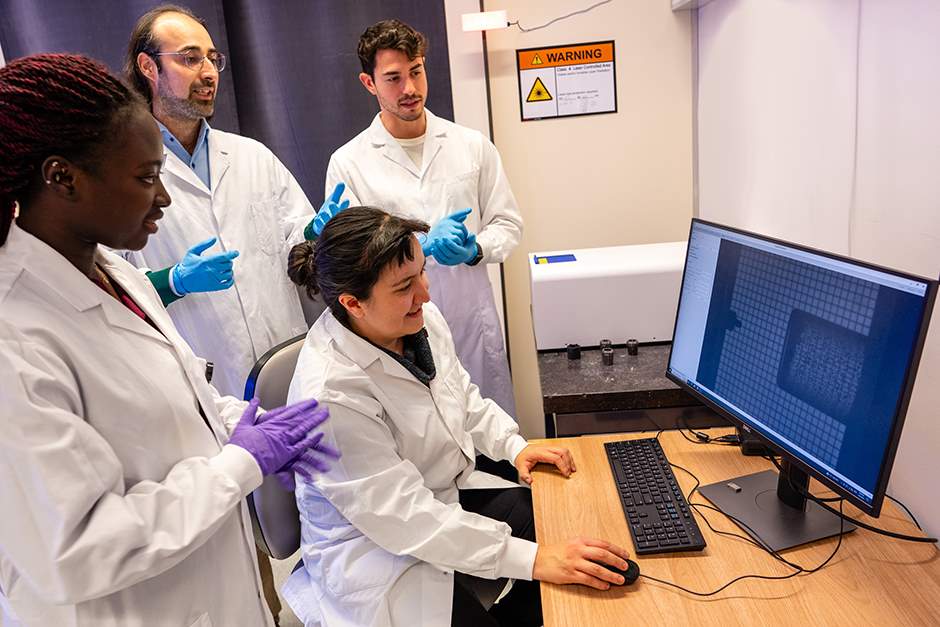People: our impact on colleagues and society
We find it important to provide a safe and healthy working environment where colleagues feel that they are seen and appreciated. And where cooperation and open communication make our work better and more enjoyable. What do our colleagues find important, and what can we do to keep them enthusiastic and committed to UMC Utrecht? These are important questions for us as an organization. Another big challenge for us at UMC Utrecht is the growing demand for healthcare combined with the shortage of people to do all the work. From our survey it appears that our colleagues are asking these questions too.

At UMC Utrecht we support our colleagues in achieving a healthy work-life balance. We find it important for colleagues to feel good. For them, and because colleagues who have the energy can provide the best care for patients and education for students, and perform high-quality scientific research.
Work-life balance thanks to guidance
One way in which we help colleagues to find a healthy work-life balance is through our ‘Werk in Balans’ (‘Work in Balance’) program. If a colleague is struggling to juggle between everything, whether at work or in their private life, they can talk with an occupational counselor at UMC Utrecht. Often this helps them to restore perspective and to retrieve a balance. Our occupational counselors work closely with managers and with our occupational doctors if necessary. We thereby prevent people from dropping out and ensure that they can (once again) do their work with pleasure and keep doing so.
(Online) training for vitality and health, increased wellbeing, and happiness at work
Via the Loopbaan en Vitaliteit (LEV) or ‘career and vitality’ platform, colleagues can focus on their own vitality and health, happiness at work, and (career) development. For example through online testing, training, and talking with a coach. We also offer a wide range of online training courses aimed at personal strength, communication, time-management, productivity, and happiness at work.
Karin, patient-participation staff advisor: “I worked a lot with LEV and Goodhabitz in the time that I was reintegrating after a long period of being off sick. This helped me get the answer to what I find important in life, and with my work-life balance. My manager gave me the space and time to do the test and follow the courses. This helped me a lot.”
The courses on time-management, ‘lekker in je vel’ (‘feeling good’), resilience and mindfulness were the most popular in 2024. With our online offer we help colleagues to stay fit and healthy and to find a good work-life balance. And to get the best out of themselves, at work and at home.A new addition in 2024 was the ‘Young parent’ program. With this program for ‘young’ working parents/care-givers, we help them find a good balance between parenthood and work.
In 2024, 803 class visits were conducted on the topic of work-life balance (1,278 in 2023)
In 2024, 1,687 employees made use of the LEV offer (2,228 in 2023) and 737 tests were done (827 in 2023)
Work less and continue to build up a full pension
UMC Utrecht already had the arrangement that colleagues who have five years to go before reaching retirement age (AOW) could decide to work 80% of a full-time job, while their pension accrual continues as if they were still working 100%. The new collective agreement (CAO) for UMCs
provides for a generational arrangement. This means that we were able to continue with our arrangement. It gives our colleagues the chance to slow down a bit without having to worry that they will accrue less pension. In this way we want to avoid too much stress in the last years before colleagues retire, which could result in them falling ill or dropping out. And of course we want to reward colleagues for all their years of commitment to UMC Utrecht.

Support for informal caregivers
We want to support colleagues who are caring for a parent, partner or other family member (informal caregivers). To find a good balance between informal care, private life and work, we have since 2024 been giving colleagues who are informal caregivers the opportunity to talk to a coach. The coach also helps informal-caregiver colleagues to make arrangements for their loved ones in terms of accommodation, welfare, healthcare, and finances. They have direct access to such a coach via an external provider. During Informal Caregivers’ day, we made a particular point of drawing colleagues’ attention to the option of coaching in informal care. Stands at UMC Utrecht and Wilhelmina Children’s Hospital were manned with coaches who informed colleagues and answered their questions on informal care.
What does UMC Utrecht do to prevent unwanted behavior?
Under the label This is Us , we promote a socially healthy work and learning environment at UMC Utrecht. We want everyone to feel seen; heard, and free to say what is on their mind. We actively communicated our vision for a socially safe working and living climate in the organization under the title ‘let’s talk about (un)wanted behavior’. We have also developed a procedure that makes it possible to talk about (un)wanted behavior. We are raising awareness among colleagues and students, strengthening their capacity to act, and helping to solve unwanted situations. In 2024 we did this for instance through:
-
Inviting colleagues for a cup of coffee and a good talk. During these 15 coffee-and-a-chat sessions, we used statements to initiate a conversation on topics that have to do with social safety. In this way we let colleagues experience what it’s like to talk with each other in the form of a dialog about topics that can be sensitive, and create awareness. This is a starting point for better understanding, more connection, and eventually, trust.
-
Asking colleagues to do the e-learning on ‘Wanted behavior at UMC Utrecht’, also to raise awareness. In 2024, 1,568 colleagues (nearly 10%) followed the e-learning course. As of 2025, it is mandatory for all colleagues to do this e-learning.
-
The new ‘Active Bystander training’ e-learning course was offered to our lecturers for the first time in 2024. Bystanders, people who have witnessed unwanted behavior, form the biggest group and can make a difference. In this training course, we make colleagues aware of this and teach them what they can do if they witness unwanted behavior.
-
It includes some 60 dialogs on social safety, which we facilitated in teams in response to requests for help. Some were to prevent a problem (preventative), and others to solve a problem. We support managers and teams in cultivating respect, appreciation and deep trust, thereby creating a socially safe working environment.
-
10 online dialog sessions with the Synthetron dialog tool . This tool helps to first of all get to the essence of a problem online. The team can then talk among themselves more effectively and together find solutions.
-
A collective tour to raise and develop awareness among students of unacceptable behavior and a safe learning environment. We also made a short film on the topic. Read more about what we do for students [link to H4.1 Our students - People].
-
Letting new managers get familiar right from the start with This is us and the power of dialog.
Through all our actions, together, we are building a culture in which everyone feels safe and appreciated. In this way, we also contribute to the retention of our colleagues.
Individual questions and reporting of unwanted behavior
For individual questions about or reporting of unwanted behavior, colleagues can turn to our office for ombuds and confidential matters .
What does UMC Utrecht do in terms of recruiting and retaining colleagues?
As for many other organizations in healthcare, it is also challenging for us to find enough colleagues
. We are therefore focusing on various ways to find new employees and ensure that our current colleagues remain at UMC Utrecht.
Recruitment and retention at UMC Utrecht
To recruit new colleagues, we showcase ourselves as an employer on our platform werkenbijumcutrecht.nl. On this platform and via social media, colleagues tell what it is like to work at UMC Utrecht. To retain colleagues, we make it easier for them to grow and progress to other roles within UMC Utrecht. In 2024, we launched a special internal website to this end. Here, colleagues can find information on growth opportunities and all job vacancies at UMC Utrecht. And request and obtain accessible information. We thereby hope to make it easier for them to grow and progress within UMC Utrecht, Or choose another career path within our organization.

In 2024 we made more use of temporary colleagues via our Flex Office (‘the Workshop’), instead of agency workers. This also contributes to finding new permanent colleagues. Via our Workshop, nurses, trainee nurses, administrative staff, and (medical) students can find temporary and flexible jobs at UMC Utrecht. These temporary colleagues regularly move on to a permanent position at UMC Utrecht. Since the start of the 2024-2025 academic year, the Workshop has also coordinated the deployment of medical students to accompany practical Anatomy classes for 1st-year Medical students. In 2024, temporary colleagues worked a total of 193,000 hours at UMC Utrecht via our Workshop.
In addition, we are training new and existing employees. Both our own (new) colleagues and (new) employees in healthcare elsewhere in the region. Read more about this
. It further helps us to retain colleagues and reduce employee shortages in the region.
Regional partnerships to recruit healthcare professionals
The shortage of colleagues is not unique to UMC Utrecht. All healthcare organizations are dealing with this. To get people interested in a career in healthcare and recruit new colleagues, we therefore also cooperate at a regional level. From Utrechtzorg in 2024, together with other hospitals in the region, we launched the recruitment platform jouwziekenhuisbaan.nl . In addition, Utrechtzorg opened the ‘Ik zorg shop’ ('I care shop') in the center of Utrecht. Our recruitment staff can regularly be found here to help people decide whether a career in healthcare would suit them. And if so, what they would need in terms of training. Together, we also thanked our healthcare professionals for their commitment with a campaign on the Utrecht Wall next to the A2.
Visitors werkenbijumcutrecht.nl: More than 600,000
Number of applicants: more than 25,000
Number of vacancies: 1,397